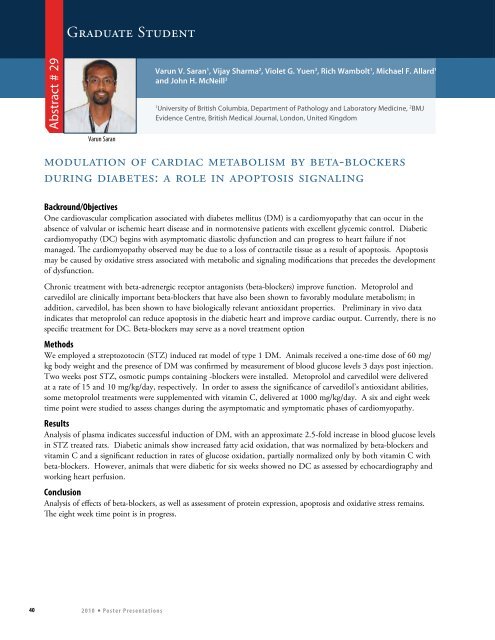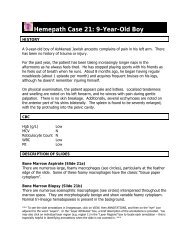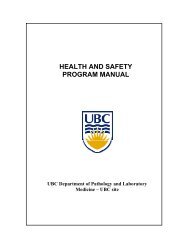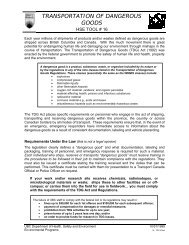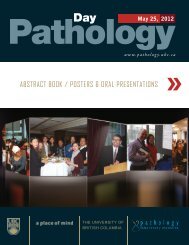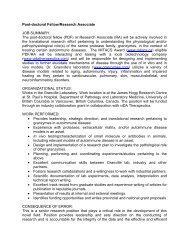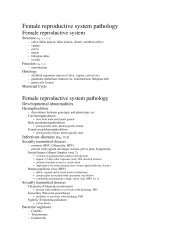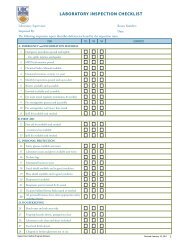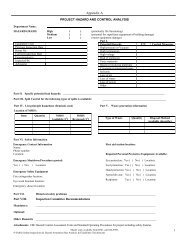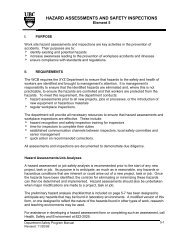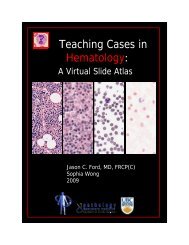Oral Presentations - Pathology and Laboratory Medicine - University ...
Oral Presentations - Pathology and Laboratory Medicine - University ...
Oral Presentations - Pathology and Laboratory Medicine - University ...
Create successful ePaper yourself
Turn your PDF publications into a flip-book with our unique Google optimized e-Paper software.
Graduate StudentAbstract # 29Varun V. Saran 1 , Vijay Sharma 2 , Violet G. Yuen 3 , Rich Wambolt 1 , Michael F. Allard 1<strong>and</strong> John H. McNeill 31<strong>University</strong> of British Columbia, Department of <strong>Pathology</strong> <strong>and</strong> <strong>Laboratory</strong> <strong>Medicine</strong>, 2 BMJEvidence Centre, British Medical Journal, London, United KingdomVarun Saranmodulation of cardiac metabolism by beta-blockersduring diabetes: a role in apoptosis signalingBackround/ObjectivesOne cardiovascular complication associated with diabetes mellitus (DM) is a cardiomyopathy that can occur in theabsence of valvular or ischemic heart disease <strong>and</strong> in normotensive patients with excellent glycemic control. Diabeticcardiomyopathy (DC) begins with asymptomatic diastolic dysfunction <strong>and</strong> can progress to heart failure if notmanaged. The cardiomyopathy observed may be due to a loss of contractile tissue as a result of apoptosis. Apoptosismay be caused by oxidative stress associated with metabolic <strong>and</strong> signaling modifications that precedes the developmentof dysfunction.Chronic treatment with beta-adrenergic receptor antagonists (beta-blockers) improve function. Metoprolol <strong>and</strong>carvedilol are clinically important beta-blockers that have also been shown to favorably modulate metabolism; inaddition, carvedilol, has been shown to have biologically relevant antioxidant properties. Preliminary in vivo dataindicates that metoprolol can reduce apoptosis in the diabetic heart <strong>and</strong> improve cardiac output. Currently, there is nospecific treatment for DC. Beta-blockers may serve as a novel treatment optionMethodsWe employed a streptozotocin (STZ) induced rat model of type 1 DM. Animals received a one-time dose of 60 mg/kg body weight <strong>and</strong> the presence of DM was confirmed by measurement of blood glucose levels 3 days post injection.Two weeks post STZ, osmotic pumps containing -blockers were installed. Metoprolol <strong>and</strong> carvedilol were deliveredat a rate of 15 <strong>and</strong> 10 mg/kg/day, respectively. In order to assess the significance of carvedilol’s antioxidant abilities,some metoprolol treatments were supplemented with vitamin C, delivered at 1000 mg/kg/day. A six <strong>and</strong> eight weektime point were studied to assess changes during the asymptomatic <strong>and</strong> symptomatic phases of cardiomyopathy.ResultsAnalysis of plasma indicates successful induction of DM, with an approximate 2.5-fold increase in blood glucose levelsin STZ treated rats. Diabetic animals show increased fatty acid oxidation, that was normalized by beta-blockers <strong>and</strong>vitamin C <strong>and</strong> a significant reduction in rates of glucose oxidation, partially normalized only by both vitamin C withbeta-blockers. However, animals that were diabetic for six weeks showed no DC as assessed by echocardiography <strong>and</strong>working heart perfusion.ConclusionAnalysis of effects of beta-blockers, as well as assessment of protein expression, apoptosis <strong>and</strong> oxidative stress remains.The eight week time point is in progress.40 2 0 1 0 * P o s t e r P r e s e n t a t i o n s


